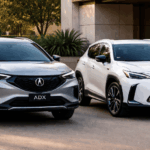How is blockchain being used in the automotive industry? This technology is being used to create security and transparency for a new wave of digital experiences.
The use of this technology is becoming a powerful ally in the automotive industry. Its made to enhance data security, provide transparency, and streamline transactions to help enhance the way that we buy sell, and interact with vehicles across various industries.
Here are some ways blockchain is aiding in the digital transition for security and helping propel vehicle data enhancement for the future.
Shared data has to be secure
Are you sharing data while driving? Even if you’re not intentionally sharing data, you probably are. Every time you utilize your GPS system or look at the vehicle performance and personal information stored in your infotainment system, your car is sharing data. Thankfully, the development of this new technology helps provide a secure, decentralized method of data sharing, which ensures your data is secure. This distribution of data across a network of computers make it nearly impossible for hackers to steal your information, ensuring your security.
Transparency for vehicle history information
One of the most relevant uses of blockchain in the automotive industry is vehicle history tracking. This allows you to learn more about the history of a used vehicle that you might want to purchase. This transparency is much better than relying on a previous owner’s records of the vehicle’s maintenance and care. These vehicle history reports also tell you about vehicle accidents and help to reduce the risk of fraud within the auto industry. Through this technology, you can feel a lot more confident in your purchase decision than ever before.
Securing payments for autonomous vehicle transactions
Some autonomous vehicles have already been used as robotaxis, which require payments for rides through apps rather than traditional methods practiced by taxi cabs. The decentralized nature of this technology secures the payment information and aids in providing a seamless process for self-driving vehicles to be used for ride-sharing services. An autonomous vehicle system could use this technology to verify identity and authorize payments while driving toward the destination. This should make transactions faster and more convenient.
Quality controls during the production process
Many automakers are using AI to optimize the supply chain for greater efficiency, but blockchain has a different role in the process. Automakers can use blockchain technology to verify the authenticity of parts and ensure their quality. The traceability of vehicle parts makes it possible to record every step of the journey for any part, from production to installation. This is critical for the efficiency of the AI system and helps create a tamper-proof record that automakers can verify and use to identify defective parts before they make it into the supply chain.
Ethical sourcing of raw materials
The increased number of electric vehicles brought the mining conditions of materials required for EV batteries to the forefront. It’s more important than ever to ensure that materials going into vehicles are sourced ethically. A company’s reputation could be in jeopardy if these materials aren’t ethically sourced. This is where blockchain technology can play a critical role. This system helps ensure material origins are from companies and locations with practices that align with strict industry standards, ensuring consumer trust in the final products.
Create digital passports
Instead of vehicle history reports, blockchain could help transition the transparency of information into digital passports. These passports could tell future vehicle owners everything about the vehicle they want to buy. This could include maintenance logs, driving habits, accidents, and more. This technology helps create a tamper-resistant scenario that helps future vehicle buyers feel much more secure and confident in their purchase decisions. Of course, some might consider this much information a violation of privacy, but if all the information applies to the vehicle, is privacy really an issue?
Reduction of fees
Using blockchain in the automotive industry means the need for far fewer transaction intermediaries. This allows for a more direct process from one party to the other. With fewer parties involved, buying a vehicle could have far fewer transaction fees, which can save shoppers hundreds of dollars every time they buy a vehicle. This would modernize the transaction process, making it much more efficient and smoother for the dealership and the customers.
Blockchain technology is becoming part of the automotive industry. The decentralized nature of this technology allows for security, transparency, tracking, and ethical sourcing of materials, which helps drivers build trust and confidence in many automakers and their vehicles.







Leave a Reply